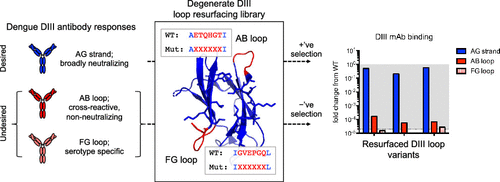当前位置:
X-MOL 学术
›
ACS Comb. Sci.
›
论文详情
Our official English website, www.x-mol.net, welcomes your
feedback! (Note: you will need to create a separate account there.)
Combinatorial Resurfacing of Dengue Envelope Protein Domain III Antigens Selectively Ablates Epitopes Associated with Serotype-Specific or Infection-Enhancing Antibody Responses.
ACS Combinatorial Science Pub Date : 2020-06-23 , DOI: 10.1021/acscombsci.0c00073 Jennifer L Remmel 1 , Kathryn S Beauchemin 2 , Akaash K Mishra 2 , Julia C Frei 3 , Jonathan R Lai 3 , Chris Bailey-Kellogg 4 , Margaret E Ackerman 1, 2
ACS Combinatorial Science Pub Date : 2020-06-23 , DOI: 10.1021/acscombsci.0c00073 Jennifer L Remmel 1 , Kathryn S Beauchemin 2 , Akaash K Mishra 2 , Julia C Frei 3 , Jonathan R Lai 3 , Chris Bailey-Kellogg 4 , Margaret E Ackerman 1, 2
Affiliation

|
Mutagenesis of surface-exposed residues, or “resurfacing”, is a protein engineering strategy that can be utilized to disrupt antibody recognition or modulate the capacity of a protein to elicit antibody responses. We apply resurfacing to engineer Dengue virus envelope protein domain III (DENV DIII) antigens with the goal of focusing humoral recognition on epitopes of interest by selective ablation of irrelevant and undesired epitopes. Cross-reactive but non-neutralizing antibodies have the potential to enhance Dengue virus (DENV) infection by a process called antibody-dependent enhancement, thought to be associated with severe secondary heterotypic infection. Thus, a focus on epitopes associated with broadly neutralizing antibodies is important both for understanding human antibody responses against DENV and for the development of a successful DENV vaccine. To engineer DENV DIII antigens focusing on the AG strand epitope associated with broadly neutralizing antibody responses, we generated yeast surface display libraries of DENV2 DIII where the AB loop (associated with cross-reactive but non-neutralizing antibody responses) and FG loop (associated with serotype-specific antibody responses) were mutagenized to allow for all possible amino acid substitutions. Loop variants that maintained the AG strand epitope and simultaneously disrupted the AB and FG loop epitopes exhibited high and diverse mutational loads that were amenable to loop exchange and transplantation into a DENV4 DIII background. Thus, several loop variants fulfill this antigenicity criteria regardless of serotype context. The resulting resurfaced DIII antigens may be utilized as AG strand epitope-focusing probes or immunogen candidates.
中文翻译:

登革热包膜蛋白域 III 抗原的组合重铺选择性消融与血清型特异性或感染增强抗体反应相关的表位。
表面暴露残基的诱变或“表面重修”是一种蛋白质工程策略,可用于破坏抗体识别或调节蛋白质引发抗体反应的能力。我们将表面重修应用于工程登革热病毒包膜蛋白结构域 III (DENV DIII) 抗原,目的是通过选择性消融无关和不需要的表位,将体液识别集中在感兴趣的表位上。交叉反应但非中和抗体有可能通过称为抗体依赖性增强的过程增强登革热病毒 (DENV) 感染,该过程被认为与严重的继发性异型感染有关。因此,关注与广泛中和抗体相关的表位对于了解人类抗体对 DENV 的反应和开发成功的 DENV 疫苗都很重要。为了设计专注于与广泛中和抗体反应相关的 AG 链表位的 DENV DIII 抗原,我们生成了 DENV2 DIII 的酵母表面展示文库,其中 AB 环(与交叉反应但非中和抗体反应相关)和 FG 环(与血清型特异性抗体反应)被诱变以允许所有可能的氨基酸取代。保持 AG 链表位并同时破坏 AB 和 FG 环表位的环变体表现出高且多样的突变负荷,适合环交换和移植到 DENV4 DIII 背景中。因此,无论血清型背景如何,几个环变体都满足此抗原性标准。得到的表面重整的 DIII 抗原可用作 AG 链表位聚焦探针或免疫原候选物。
更新日期:2020-06-23
中文翻译:

登革热包膜蛋白域 III 抗原的组合重铺选择性消融与血清型特异性或感染增强抗体反应相关的表位。
表面暴露残基的诱变或“表面重修”是一种蛋白质工程策略,可用于破坏抗体识别或调节蛋白质引发抗体反应的能力。我们将表面重修应用于工程登革热病毒包膜蛋白结构域 III (DENV DIII) 抗原,目的是通过选择性消融无关和不需要的表位,将体液识别集中在感兴趣的表位上。交叉反应但非中和抗体有可能通过称为抗体依赖性增强的过程增强登革热病毒 (DENV) 感染,该过程被认为与严重的继发性异型感染有关。因此,关注与广泛中和抗体相关的表位对于了解人类抗体对 DENV 的反应和开发成功的 DENV 疫苗都很重要。为了设计专注于与广泛中和抗体反应相关的 AG 链表位的 DENV DIII 抗原,我们生成了 DENV2 DIII 的酵母表面展示文库,其中 AB 环(与交叉反应但非中和抗体反应相关)和 FG 环(与血清型特异性抗体反应)被诱变以允许所有可能的氨基酸取代。保持 AG 链表位并同时破坏 AB 和 FG 环表位的环变体表现出高且多样的突变负荷,适合环交换和移植到 DENV4 DIII 背景中。因此,无论血清型背景如何,几个环变体都满足此抗原性标准。得到的表面重整的 DIII 抗原可用作 AG 链表位聚焦探针或免疫原候选物。











































 京公网安备 11010802027423号
京公网安备 11010802027423号